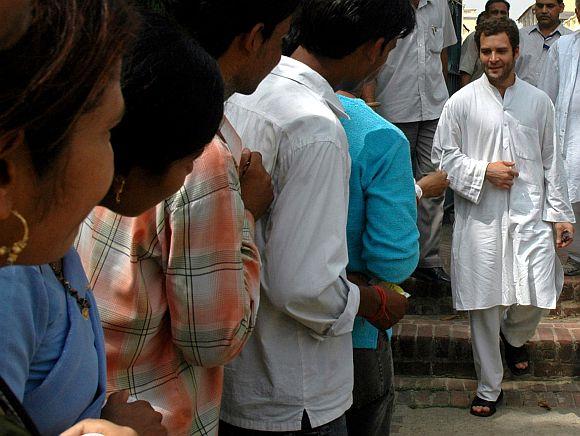
What did Rahul Gandhi do wrong in Uttar Pradesh and what does he need to do now to stop the slide? Veenu Sandhu tries to find out.
It is March 12, the opening day of the budget session of Parliament, and President Pratibha Patil has just addressed a joint session. Television crews are on the lookout for Rahul Gandhi. But the man who was all over TV till 10 days ago is nowhere to be seen. It soon becomes clear that Gandhi hasn't turned up.
The next day, he skips the dinner hosted by Prime Minister Manmohan Singh for United Progressive Alliance allies. But he shows up on March 16 for Finance Minister Pranab Mukherjee's budget speech. He sits through it expressionlessly, his fist covering his mouth. The beard, which has become a trademark when he's campaigning or holding rallies in the hinterland, is gone.
For Parliament, his look is usually clean-shaven. Emerging from Parliament House later that day, all he tells TV reporters is: "It's a good budget." He doesn't stop to explain why.
Please ...
Click here for more Realtime News on Rahul Gandhi!
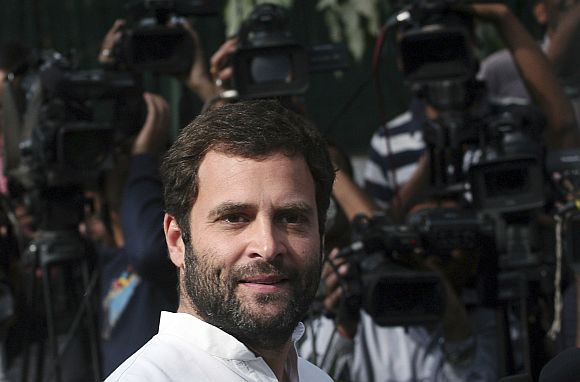
Even after nearly eight years in politics, the man who is projected as his party's next prime ministerial hope is not known to express his views on matters of immediate concern.
It is only systemic issues that he speaks on. His repeated assertions of two Indias and the need to bridge the divide between the rich and the poor are often the subject of his public utterances. But, whether he thinks the current budget being debated in Parliament will bridge that gap or widen it, we will never know.
The brand Gandhi had been trying to build for himself all these years is that of a silent, serious man who wants to focus all his energies on bridging the gap between the two Indias and empowering youth by offering them political participation in the refurbished and democratised youth outfits of the Congress.
In the campaign for the 2009 Bihar assembly polls, that silent, serious man promised a government for the poor. It did not work. The Congress's tally came down from nine to four seats in the state assembly. The brand failed to deliver.
In Uttar Pradesh in 2012, he lashed out at Mayawati's government, alleging she was using up Central funds meant for the poor. Mayawati's Bahujan Samaj Party lost the election, but Congress's score was just 28 of the 403 seats at stake.
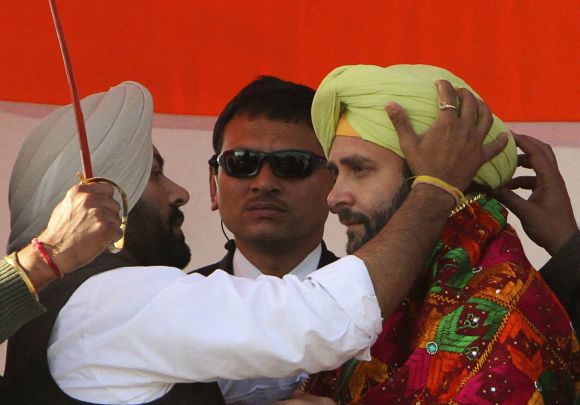
Gandhi slogged in the campaign for weeks together; even his bitterest rivals admit that. But why didn't the hard work turn into votes? "His speeches in Uttar Pradesh should have reflected a vision for the state," reasons Sudha Pai, professor at the Centre for Politics, Jawaharlal Nehru University.
"He ought to have mentioned what are the concrete steps that his party would take to make a difference in UP. Some sort of an ideological position should also be clear. When Gandhi contemptuously tore up a list of promises that the Samajwadi Party had made in its manifesto, he also declared that the Congress was not going to make promises. The voters, in delivering a clear mandate in the favour of SP, showed they preferred the promise of a better state of affairs over mere theatrics.
"The voter wants substance, not just style," says a political scientist who has closely followed the Nehru-Gandhi family's politics but does not wish to be named. "The voter wants to know what you have to offer."
Whether it was Bihar in 2010 or UP in 2012 or his fight for the tribes of Lanjigarh in Orissa, Gandhi's has been a politics of the offensive, of attacking the ruling governments of the state.
Kunal Lalani, managing director of Crayons Advertising which handled Congress's political campaign in the recent Punjab elections, says, "There was too much of negative campaigning. It should not all be about showing others down without offering concrete alternatives."
Lalani, whose company was also responsible for Congress's print, out-of-home and digital media campaigns during the 2009 Lok Sabha elections, adds, "It was all attack, attack, attack followed by the call to bring change. But the way forward was neither shown nor specified."
Congress's punch line in UP was Utho, Jaago, Badlo (Rise, Awaken, Change). But change how? Gandhi failed to specify.
"Elections," says image consultant Dilip Cherian who has worked on various political assignments, "are no longer won by last-minute moves. Gandhi's image of 'I am leading from the front and my mother and ancestors are just props' doesn't work. They have a much longer history of public connection."
He also feels "if you are a frontal party leader, then you have to live it 24x7. That's what the voter expects you to do full-time. You cannot 'have a life'. I think that is held against him."
Incidentally, it's less than 20 days since the UP and Punjab results emerged -- one would have expected Gandhi to sit down with his team for some serious introspection. Instead, Gandhi flew out of the country.
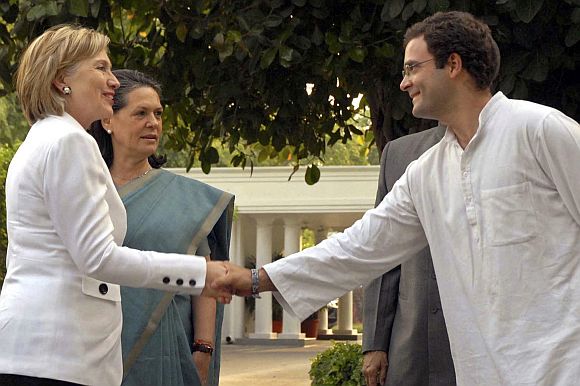
"Gandhi has not created an image of somebody who is accessible. He has to correct that image if is to be a mass leader," Cherian says.
Pai recalls a comment which Rashtriya Janata Dal chief Lalu Prasad had made about Gandhi once. He had said, "Can Rahul baba eat sattu (a powder of pulses and cereals)?" "What he meant was: is he a man of the masses?" says Pai.
"I think he (Gandhi) is trying very hard but has succeeded only to an extent. As compared to him, Prasad is far more successful as a local leader in mobilising the backward classes."
Gandhi had met Pai back in 2005 for lessons in UP politics.
The problem of access is not restricted to Rahul's office-cum-residence, 12 Tughlaq Lane. An insider reveals that there's also a serious lack of connect with Congress workers at the grassroots level.
"During the UP campaign, he would return from a meeting or rally around 6.30 pm and go straight into the local guest house. From then to around 9 the next morning, the only person who would have access to him would be Kanishka Singh (his political aide) or other such people from his inner circle. The evening sessions with workers -- discussing, strategising, sharing a meal and debating -- are crucial to integrate with them.
That's the workers' time with their leader. He doesn't participate in this."
Another political scientist expresses a similar concern. "Gandhi is trying to energise and democratise Indian Youth Congress and National Students Union of India. But in the end, it's the sons and daughters of politicians who are really making it to the top in many places."
Gandhi, he adds, "is mistaking form for substance. He's running a marathon when his party needs him to run a 100-metre dash."
Gandhi's repeated refrain has been that he is looking at long-term results. Political analysts, however, argue that in politics, a week can be counted as long-term.
"If Gandhi wants to succeed, he has to run the marathon and the 100-metre dash simultaneously," says the analyst.
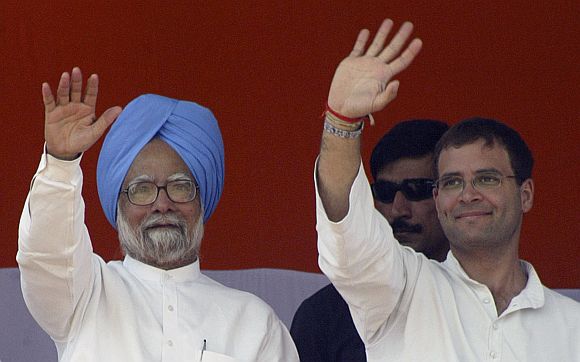
Cherian lists three main areas that Gandhi needs to work on. "One, he needs to display much higher levels of time commitment. Two, he must have a team that is less dominated by any one type. And three, he needs to choose his battles more carefully. That is, he needs to figure out what are the states and areas where he can intervene with positive results."
Adds communication specialist Alyque Padamsee: "I would like to see Gandhi thinking and acting like a CEO if he wants to lead Youngistan. I hope he will surround himself with intelligent corporate-minded people -- someone like Narayan Murthy, Nandan Nilekani, Sam Pitroda and Ratan Tata -- who can help in analysing what actions bombed and do an honest post-mortem."
Apart from shades of arrogance that emerged when Gandhi tore SP's list of promises there was also criticism that his speeches were repetitive. The refrain of "Centre paise bhejta hai magar yahaan haathi sab kha jaata hai (Centre sends funds, but Mayawati misappropriates them)" was repeated ad nauseum. The attack lacked newness and, after a point, sounded jaded.
Image consultants say it's time Gandhi widened and deepened his content. Along the way, there were other disasters too.
Using Sam Pitroda's OBC link for votes was "the definition of an image disaster" says Cherian. "How can you pull out an English-speaking man who has lived all his life in America and try to make him a mascot in the Hindi heartland?"
Worried that the states are "spinning out of Congress's hands," veteran party leader Mani Shankar Aiyar says, "The days of Indira and Nehru are over. We cannot win elections on charisma or mascots anymore. All states today have powerful state leaders. We need both charisma and organisation."
He goes to the extent of saying that if Congress wants to buck the trend, then inner party democracy is the only way ahead.
"Have elections, right from booth to Congress Working Committee level. It will shake up the coterie, but it has to be done." Padamsee advises: "Roll up those sleeves, Rahul, but this time go out and accomplish something concrete for the country."
Veenu Sandhu is co-author of Rahul, the recently published biography of Rahul Gandhi. (Priyanka Joshi in Mumbai contributed to this article).